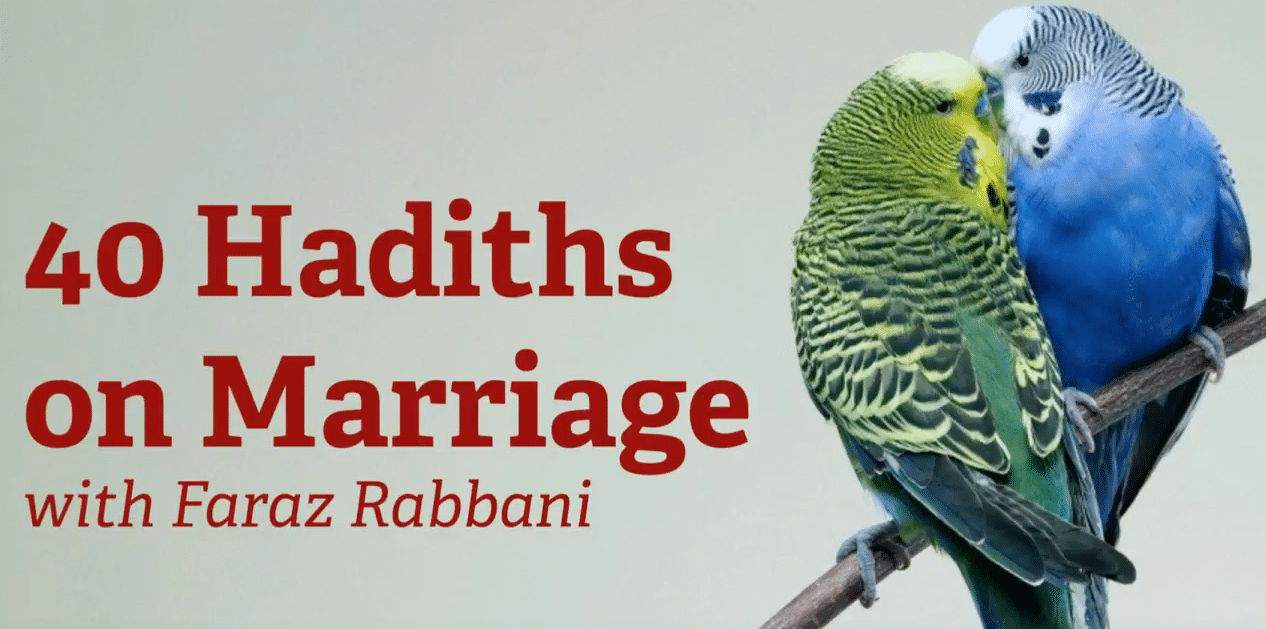40 Hadiths on Marriage – Recapping the Live Seminar with Shaykh Faraz Rabbani
There is a lot of confusion — and a lot of talk — about marriage.
To understand what a successful marriage is, and the key issues and challenges facing marriage, Shaykh Faraz looks at 40 hadiths of the words and example of the Prophet Muhammad (peace be upon him).
The PDF of the hadiths covered in the seminar, with their translations could be found here.
The first hadith Shaykh Faraz covered encourages whoever is able to do so, to get married. Prophet Muhammad (peace and blessings be upon him) said: “O youth! Whoever of you is able to marry should do so…” Shaykh Faraz explained that marriage is generally praiseworthy and recommended in Islam.
However, through the second and later hadiths, Shaykh Faraz pointed out that marriage is not obligatory. People may have certain circumstances that bar one from marriage. Examples could vary from seeking scholarship, to taking care of parents or the elderly. These actions are meritorious and may be a good reason for not getting married. There are examples of great Muslim scholars who did not get married, like Imam Nawawi.
Shaykh Faraz also discussed what one seeks in a spouse. The Prophet (peace and blessings be upon him) said, “A woman may be married for four reasons: (1) her wealth; (2) her social status; (3) her beauty; and (4) her religion. Seek the one who has religion and you will rejoice.” Shaykh Faraz explained that these categories also apply to men, and it was because the Prophet (peace and blessings be upon him) was speaking to men that it was worded regarding women. On an aside, Shaykh Faraz pointed out that the hadith entails that women can have their own independent wealth. This hadith emphasizes that the basis for choosing in marriage is religion, while the other reasons could be secondary considerations. He also explained that religion is not just an external appearance, rather it is good character and sincere concern.
Good character was one of the constant themes that the hadiths called to and were highlighted in the seminar. Not just to seek good character in a spouse, but to also strive to acquire and uphold good character one’s self. The Prophet (peace and blessings be upon him) said: “marry those caring and nurturing”. Good character in marriage is so important, so much so that it was the reason why marriage is half the religion. The Prophet (peace and blessings be upon him) said: “if a servant gets married, they have completed half their religion”.
An indicator of faith and sign of faith is good character, as mentioned by the Prophet (peace and blessings be upon him) in the hadith. Nothing tests one’s character and sincerity like relationships, especially between spouses. To perfect our faith we need sincerity, in worship, conduct and character. This is manifest in our relationships. That is why the Prophet (peace and blessings be upon him) said that “the believers most perfect in faith are those best in character, and the best of you are those best to their spouses”.
One of the points that Shaykh Faraz greatly emphasized is the intention behind marriage. He polled the audience for some of the intentions behind getting married. He actually challenged by saying: “Why should we marry? Especially, there’s a materialist argument against it?”
Some of the responses from the audience were:
To seek family, to seek companionship, for social security, to continue the cycle of life, for psychological and physical needs, to love someone, to protect one’s religion… and other answers.
Shaykh Faraz then narrated the hadith of intention. The Messenger of Allah (peace & blessings be upon him) said, “Actions are by intentions. And each person will have whatever they intended. So whoever’s migration was to Allah and His Messenger, then their migration was indeed to Allah and His Messenger. And whoever’s migration was for some worldly gain or a woman to marry, then their migration was to whatever they migrated for.”
Shaykh Faraz then commented that all the mentioned answers are reasonable, however, excellence of intention, and the Prophetic sunna is to intend any action soley for Allah. Like migration, it wasn’t to flee persecution. It was for Allah. It’s a very deep meaning of life. Otherwise, misery may creep into daily actions. This is the most important hadith about marriage. Anyone going into marriage should intend: “I want to seek closeness to Allah, and seek the pleasure of Allah by getting married”. How? Through all of the of the reasons the audience mentioned. However, none of those reasons are an end on it’s own.
Also discussed in the seminar were some of the challenges facing those getting married. They included over-complicating marriages, financial burdens, social and familial pressures, and others. Shaykh Faraz counseled everyone to not complicate marriages, and rather facilitate them. He also warned against conducting private marriages, and explained that it is contrary to prophetic guidance. Registering marriages and publicizing them helps protects rights.
Finally Shaykh Faraz provided some key advice, through the prophetic example, of best practices to uphold in a marriage. They included nurturing playful intimacy, to correct the other positively instead of criticizing, being in the aid and service of the other, giving attention and affection to the other, and exchanging gifts. He also emphasized that there love and gratitude should be expressed. One should express their gratitude verbally as well as physically, until the other knows that you are truly grateful. The glue that keeps relationships going is caring and mercy (mawada and rahma) as called to in the verson marriage in the Qur’an (Surat al-Rum, 21). One way to uphold that, is to express one’s love.











